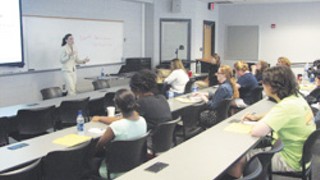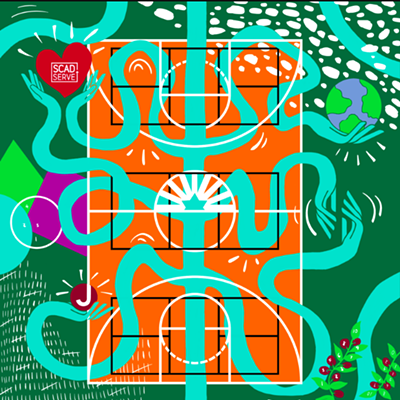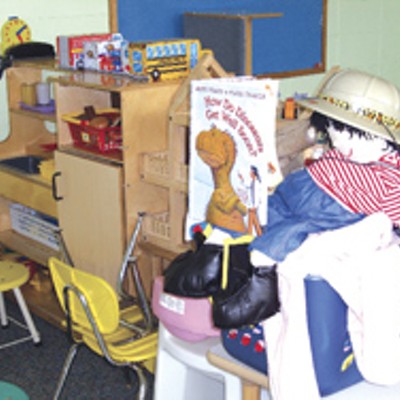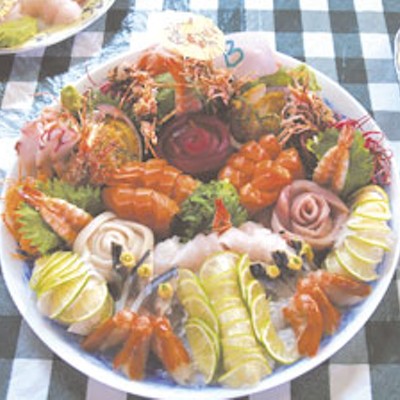LOCAL UNIVERSITY and city police train together following the Virginia Tech shootings. Georgia students become ineligible for HOPE scholarships. A popular university student leader dies just weeks after his leukemia diagnosis.
These news items, of interest to many Savannahians, are particularly relevant to the students and faculty of Armstrong Atlantic State University (AASU). And, they are all front page news in the August 23 issue of The Inkwell, AASU’s weekly student newspaper.
“Our focus is to report the news in a timely, accurate manner,” says Angela Mensing, AASU senior in Liberal Arts and the new editor-in-chief of The Inkwell. “It’s an Armstrong-focused paper, primarily news that affects our students.
“When we say students I’m not talking the typical 18 to 21 year old students. We have a lot of students affected by the military, affected by local and national events. We bring it to the college level and draw a parallel of what’s going on on campus.”
Each of the three largest local universities publishes a student-run newspaper, and at least two (at AASU and Savannah State University) have expansions planned for this year, flying in the face of national print journalism trends. The Tiger’s Roar is a six page broadsheet (the typical newspaper style layout) that’s published monthly by Savannah State University (SSU) students. The Tiger’s Roar hopes to increase its pages and go to tabloid format (used by Connect Savannah).
The Inkwell recently went to an eight page broadsheet from tabloid, and has its sights set on 12 pages later in the year. Meanwhile, Savannah College of Art and Design’s (SCAD) District is a weekly student publication, a 16-20 page tabloid
Like Mensing, Tiger’s Roar Executive Editor Jazzmynn Lewis and District Editor-in-Chief Lee Burbage focus on university news but try to expand coverage to include non-college news relevant to their readers.
“Our readership is students, whether they live on- or off-campus. We want our paper to be relevant to everyone,” says Burbage, a sophomore studying writing and photography.
The Inkwell and Tiger’s Roar targets the entire university community with an emphasis on student readership. Each newspaper receives most of its funding through the university, but each says it speaks with an independent student voice. “The final OK is always up to the editor in chief,” says Lee Burbage, District Editor-in-Chief.
“This is 100 percent true,” says Jessica Clary, SCAD’s Assistant Director of Student Media and advisor for District. “SCAD administration does not subject the paper to prior review before publication.”
A glance through past stories, online or in print, seems to support the three papers’ claims. A humor columnist on The Inkwell’s editorial page describes his “regimen of drinking light buds and then smoking blunted buds,” behavior not typically endorsed by universities.
Op-ed pieces on websites for The Tiger’s Roar and District criticize a host of campus actions—class rescheduling without student input, methods of publicizing student activities, and a perceived lack of authentic representation by student government.
The Inkwell’s editorial independence hasn’t insured its popularity. Although Mensing says the AASU administration keeps its hands off, she reports that some faculty members criticize the paper.
“We’ve had professors say very openly that they don’t like The Inkwell, that it’s poor writing. We had a professor call up and talk about why a columnist used the word ‘ta-ta’s’ in his column. It goes back to freedom of speech.”
Mensing and Lewis are both new this fall to their roles. They have similar opportunities and similar goals for their publications.
“This year the turnout is bigger than we’ve had before, with many people wanting to work on the paper,” says Lewis, a senior in Mass Communications and English. “We’re trying to bring in a new incentive to make sure students stay focused, by giving a stipend to the staff writer who publishes the most stories by the end of the semester.”
The Inkwell is also seeing a staffing boom this year, with a heavy freshman contingent. The AASU paper pays writers and photographers $10 for each published story or photo.
In late August, The Inkwell sponsored their second annual Journalism Bootcamp, a day-long series of workshops for new staff. Robert Bush, a public interest attorney, dug into the state’s open meetings and open records laws.
Lewis and Vaida Morgan of The Tiger’s Roar attended Journalism Bootcamp at the invitation of AASU and The Inkwell. “That experience was very informative,” says Lewis. “Some of the stuff I did know, but there’s nothing wrong with a reminder, of how planning is important.”
While at boot camp, editors of the two papers discussed possible collaboration “I’d like to see Armstrong and Savannah State do something together, a joint issue, maybe The Inkwell Roar,” says Mensing.
“I really believe it’s a great idea,” says Lewis. “A way to bring the universities together. It also brings variety to the community.” 
College Media Online
With web journalism changing the world of newspapers, Savannah’s college papers have met the online challenge with varying degrees of success. The Tiger’s Roar and District each has a presence online, and The Inkwell plans to start a website this fall.
“This will be our second year online,” says Jazzmynn Lewis, editor of SSU’s Tiger’s Roar. “Everything that’s in print will be online, but any quick briefs that we’d like to add will be the weekly update.”
The SSU publication’s site, www.tigersroar.com, is hosted by College Publisher, a site developed for university newspaper content management. The masthead identifies itself as “The Independent Student Voice of Savannah State University.” and has links to the university website and to two sites affiliated with historically black colleges and universities.
The Tiger’s Roar website was last updated in July 2007, making it the most current website of those offered by the three schools. Since the newspaper hasn’t published since mid 2007, during Spring Semester, the July date is more current than it might appear at first glance. The site makes clear that The Tiger’s Roar is off duty until fall, and the latest article is a call for writers and photographers beginning Fall Semester.
Web design-wise, District’s website, www.scaddisstrict.com, has more features than the Tiger’s Roar site, but lacks essential information. The masthead says “District” but makes no mention of SCAD on the site except for random references buried within news stories. There’s no indication that the site is the online presence for a print publication. There’s no contact information, and the site has not been updated since February 5. Most of the stories are ten or eleven months old.
When The Inkwell launches its site this fall, it will also be hosted by College Publisher, at www.theinkwellonline.com.
In keeping with news industry trends, The Inkwell and The Tiger’s Roar have expanded their editorial staffs to manage online content.
“We’ve already hired a web editor,” says Angela Mensing, editor-in-chief of The Inkwell. “We’ll be working with the Armstrong office that handles podcasts.
“We will have daily updates,we’ll have blogs, we’ll have forums, we’ll have a city section, online polls,”says Mensing.
“It opens the doors, almost like a syndication with other colleges. We’ll have access to other college papers.” -- Robin Wright Gunn
































